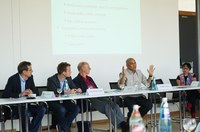Successful international conference by FRIAS Research Focus “Dynamic Alignments and Dealignments in Global Southeast Asia”, June 24-26, 2015
The international conference "Dynamic Alignments and Dealignments in Global Southeast Asia", held by the four organizers of the FRIAS Research Focus, Jürgen Rüland, Judith Schlehe, Günther Schulze and Sabine Dabringhaus, brought together both young and experienced scholars with various disciplinary backgrounds from Asia, Europe, Australia and the US. The unique international and interdisciplinary character of the conference created a thriving dialogue about mechanisms of conflict and cooperation in Southeast Asia. The Research Focus examined how global flows and challenges impact actors, patterns and processes that drive social and institutional adjustments in this strategically important, economically vibrant, culturally diverse and politically volatile region. The conference served as a stocktaking exercise of current work within the FRIAS Research Focus, presenting the work in progress of FRIAS Fellows and guests, as well as seeking further input from invited colleagues.
The opening keynote speech, held within the framework of the FRIAS “Freiburger Horizonte” series, on “The Economic Rise of Southeast Asia: Narratives, Lessons, Implications” by FRIAS Fellow Hal Hill from the Australian National University marked the beginning of an exciting two day conference. By highlighting the ever increasing importance of the Asian-Pacific region for global economics and politics, Hal Hill managed to immediately capture the audience with his insightful perspectives on economic developments in Southeast Asia (more information on the lecture here).
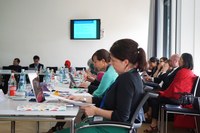 | The conference was then structured into four main panels, each led by one of the organizers of the FRIAS Research Focus Southeast Asia. The first panel on “The Changing Nature of Political Cooperation in Southeast Asia” was convened by Jürgen Rüland, professor for political science at the University of Freiburg. |
|---|---|
| The discussion focused on the Association of Southeast Asian Nations (ASEAN) with its norms, transformations and challenges. The political and economic dynamics of the region, pressures of democratization, trajectories of regional governance, the rise of China and India and the renewed presence of the United States under its “rebalancing policy” were especially highlighted. Among the speakers and chairs were Mikko Huotari from the Mercator Institute for China Studies, Berlin, FRIAS Fellow Mark Beeson from the University of Western Australia, Perth, FRIAS Fellow Stefan Rother from the University of Freiburg, Muhadi Sugiono from the Gadjah Mada University in Yogyakarta, Indonesia, Pavin Chachavalpongpun from the University of Kyoto, Jürgen Rüland from the University of Freiburg and Salvador Santino Regilme from the Nothern Illinois University, De Kalb. | |
| The second main panel, convened by Judith Schlehe, professor for sociocultural anthropology at the University of Freiburg, shifted the focus to concepts of alterity and identity in Southeast Asia, thereby shedding light on Southeast Asians’ assumptions about the world and their place in it. Tracing the historic and cultural trajectories leading to | 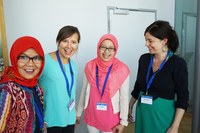 |
|---|---|
| politics of difference and related interpretations of sameness and difference, ethnographic case studies on the perception of the self and the other were presented. A special focus was placed on the manufacturing of identity and alterity in the relationship between the Malay-Indonesian world and the Middle East. In a panel on “imageries from the ‘Arab world’” chaired by Ariel Heryanto, professor at the School for Culture, History and Language at the Australian National University, Eva F. Nisa from the University Negeri Jakarta, Indonesia, and Judith Schlehe presented the findings of their research on the network of Indonesian Alumni from the Al-Azhar University in Cairo, Egypt. As the largest group of alumni in Indonesia, they are well organized and serve as a bastion of moderate Islam in the Sunni world. | |
|
| The second day of the conference focused on the “Political-Economic Consequences of Alignment and Dealignment in Localized Indonesia and the Philippines”. Organized by Günther Schulze, professor of economics at the University of Freiburg, the panel analyzed the important consequences of political alignment and its antipode, political rivalry, on political and |
|---|---|
| economic outcomes in the context of these two leading Southeast Asian nations. Chaired by Prof. Hal Hill from the Australian National University of Canberra, the first part focused on political economics of alignment and rivalry in the context of decentralization. FRIAS Fellow Joseph Capuno presented his paper on the effect of political competition on fiscal and economics outcomes in subnational Philippine jurisdictions, and Gerrit Gonschorek and Günther Schulze gave insights into their work on the political economy of central government transfers in Indonesia. The second part, chaired by Krisztina Kis-Katos, principal researcher at the University of Freiburg, was devoted to important governance issues: political dynasties and the freedom of the press. Among the topics discussed were the murder of journalists in the Philippines (Antonio Farfan from the University of Freiburg) and the impact of political dynasties (Joseph Capuno FRIAS Fellow from the University of the Philippines, Antonio Farfan and Günther Schulze). Moreover, Christian von Lübke from the Arnold-Bergstraesser-Institute and Joseph Capuno discussed the issue of elite contestability and possibilities of good governance in Philippines cities. | |
| The last main panel of the conference took a historical perspective on Southeast Asia. Led by Sabine Dabringhaus, professor for East Asian History at the University of Freiburg, the historical perspectives on transcultural interactions in Southeast Asia were discussed. Here, Southeast Asia was examined as a region that has been a victim of the concept of the | 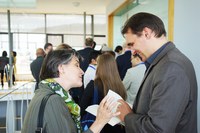 |
|---|---|
| nation-state, but that is traditionally characterized by cross-border historical, cultural, linguistic and environmental ties. The first part of the panel, chaired by Nurul Ilmi Idrus from the Hasanuddin University of Makassar, Indonesia, talked about the modernization of tradition and how local cultures of cooperation change. Furthermore, Agus Suwignyo, FRIAS Fellow from the Gadjah Mada University, Yogyakarta discussed the non-state institutions of welfare and citizenship: Gotong Royong in Indonesia and Jajmani in India. FRIAS Fellow Katja Rangsivek, posed the question of why a Thai Royal cannot be buried in England. In a second part, chaired by Kiyoshi Fujikawa from the Nagoya University, concepts of Chineseness in Southeast Asian Environments and the promotion of Mandarin in Java in the 1900s, by Sai Siew Min from the National University, were discussed. Han Xiarong from the Lingnan University in Hong Kong gave insights about the historic and current Sino-Vietnam relations and the relevant state and non-state agents in Sino-Vietnamese cultural exchanges. | |
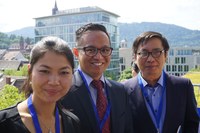 | All in all the conference demonstrated how FRIAS Fellows and guests from different academic fields and parts of the world shed light on socio-economic and historic issues in Southeast Asia in a collaborative effort. It gave fascinating insights on the challenges, actors and processes that shape dynamic alignments and dealignments in Global Southeast Asia. Combining different aca- |
|---|---|
| demic perspectives and methods, the FRIAS Research Focus Southeast Asia managed to put together a remarkable conference, thus also attesting to the reputation of the University of Freiburg as a place for state-of-the-art research on Southeast Asia. | |
07/2015

